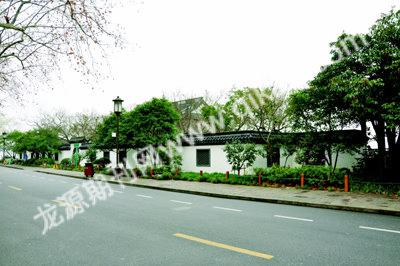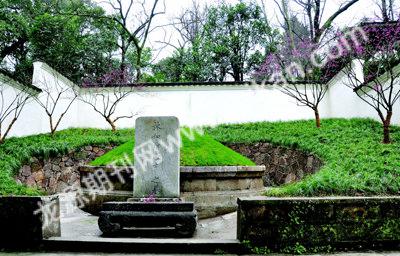West Lake and Its Candidacy for World’s Cultural Heritage
2009-06-30

The other day a journalist from Cultural Dialogue interviewed Mr. Chen Wenjin, director of the Work Group for Applying World Cultural Heritage for West Lake.The following is a gist of what Mr. Chen says about the West Lake, preparations for the application, and understanding of the lake as a perfect specimen of Chinese culture.
Progress in Application
By the end of January, 2009, the procedural work concerning the West Lakes candidacy for worlds cultural heritage had been completed and the official documentation reached the headquarters of UNESCO as stipulated so that it is now ready to be examined at the 2010 assembly of the World Heritage Center. The official application documentation includes the approval of the Chinese National Commission for UNESCO and the Chinese governments application document signed by Premier Wen Jiabao. Experts from the International Council on Monuments and Sites will, after an official inspection on the West Lake in Hangzhou, submit an evaluation report and their recommendation. They will also present suggestions and advices to the applicant for improvement. The Chinese Governments application for the West Lakes Worlds Cultural Heritage status will be officially discussed at an assembly of the UNESCO World Heritage Center in 2010. The result is pending till the general assembly in June or July 2010.
Heritage-Centered Improvement Projects on the West Lake
Unlike other worlds cultural heritage sites in China which underwent huge improvement projects before the successful inscription on the list, the West Lake does not need radical refurbishment projects. The lake has been under the state protection since 1949. Though the lake needs further improvement, projects introduce some minor amendments. Since a large-scale new West Lake project started in 2002, the preservation of the lake has been going on, paving a solid way to apply for the heritage status for the lake. Moreover, an improvement project is being carried out at major ten scenic sites and other related spots. As the highly professional project is going on quietly beyond the media attention, tourists and citizens in Hangzhou may not notice anything big done to the sites. Improvement and preservation is a long-term proposition. Even if the lake is successfully inscribed as a world cultural heritage, a long-term preservation project will still be needed.
West Lake as a Landscape Heritage
Solid and convincing reasons support the West Lakes application for a landscape heritage status, a subcategory of cultural heritages. First, the lake started the countrys tradition of giving poetic names to scenic spots. This pioneering role gave the lake a unique status. The ten scenic views of the West Lake embody not only a unique oriental aesthetics but also a perfect combination of humanity, nature, and culture. They best embody the characteristics of the lake and its universal value. The ten scenic views trace back to the Southern Song Dynasty (1127-1279). The core value of the West Lake is that it creates an aesthetic conception and a frame of mind. In the early Qing Dynasty (1644-1911), the ten scenic views of the lake were ten small independent groups of buildings where humans could blend themselves with nature and culture defined by the lake. In some years after 1949, many such buildings were demolished so as to make the lake one large open park. The present refurbishment project does not aim to restore the past exactly. It maintains the status quo and adds minor touches in a bid to restore the recognized aesthetic conception and the frame of mind.

Accelerated Pace for Application
The idea germinated more than ten years ago but for a long while there was little progress. The main reason for the little progress was that no accurate positioning could be found for the West Lake. In other words, we were unable to say why the lake should be a world cultural heritage. Our previous understanding of the lake did not make the lake stand out.
As a professional, I had been contemplating this question for years. The breakthrough came about in the form of “Discover the West Lake”, a book I wrote in 2005. On the basis of many good ideas from domestic experts, it successfully answers the question of what the lake is. I contend in the book that the West Lake appears as a natural landscape, but it is actually a cultural existence. It is a classic example of aesthetics created by traditional Chinese culture. It is a whole narrative system based on natural beauty and Confucius aesthetics and creative human endeavors for more than 1,000 years. The value of the West Lake lies in its wholeness, not in separate scenic views. The lake does not shine if its scenic views are individually and separately compared with other world cultural heritage sites.
Rapid progress has been made in the application since the theoretical breakthrough. Culturally and historically, the new understanding enables us to see the unique value of the West Lake. The application is also made possible and easier thanks to the continuous improving touches over past years.
Possible Effects of the Heritage upon the Lake
It is predicted that desirable benefits will result from the successful inscription of the heritage status. There have been setbacks and successes in the conservation of the lake over the past 60 years. There will be no more reckless decisions for preservation and improvement endeavors. Feasibility studies and approval procedures for lake projects will be strict. But that does not mean we will adopt a no-project policy. The lake will surely need new input as time goes on.
We need to take into consideration three factors in the future concerning the West Lake. First, the strategy that downtown Hangzhou expands eastward across the Qiantang River for further urban growth provides a general guideline for harmonizing the relationship of the city and the lake. More follow-up measures will be adopted to further ease the population and traffic pressures on the lake area. Second, more attention will be paid to the cultural contents of the scenic views of the lake while existing hills, water, woods and springs must be well protected so that they can best embody the cultural contents. Third, we need better embody the relationship between today and yesterday in the views of the West Lake. For example, a restoration or refurbishment project must strictly follow the architectural rules of a specific dynasty.
The Significance of the West Lake as a World Cultural Heritage
Zhejiang is a province of prominent culture and antiques. In the past we were sorry that we didnt have a world cultural heritage. We are going to make a breakthrough after all these years. In addition to the West Lake, applications for world cultural heritage statuses for the Beijing-Hangzhou Grand Canal and Liangzhu will be officially launched pretty soon. Every citizen in Zhejiang can feel pleased with the progress in this direction. □
